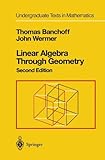Found in 2 comments on Hacker News
mathaftermath · 2016-07-24
· Original
thread
My favorite LA books are Linear Algebra by Friedberg/Insel[0] which is a combination of Axler style book with more computation oriented one (Terry Tao has a set of lectures based off this book). Another one I like is Modern Intro To LA by Henry Ricardo[1] which implicitly introduced me to Replacement theorem which is really overlooked in a ton of LA books. Again, this book's a rigorous mixture of both theory and computation done very well. If you've never seen higher level math before, there's Linear Algebra: Gateway to Mathematics by Robert Messer[2]. It has tons of commentary about elementary set theory and proof techniques along the way. Whenever someone mentions Axler's book, someone else brings up Treil's book. But there's a third one in the same league/group which is Linear Algebra: An Introduction to Abstract Mathematics by Robert Valenza[3]. Other favorites are Coding the Matrix by Philip Klein[4] for Python aficionados and
Linear Algebra Through Geometry by Banchoff/Wermer[5] for those who like geometry.
If you are way beyond all this, you can still pick up new things from Advanced Linear Algebra by Steven Roman[6].
[0] https://www.amazon.com/Linear-Algebra-Stephen-H-Friedberg-eb...
[1] https://www.amazon.com/Modern-Introduction-Linear-Algebra/dp...
[2] https://www.amazon.com/Linear-Algebra-Mathematics-Robert-Mes...
[3] https://www.amazon.com/Linear-Algebra-Introduction-Mathemati...
[4] https://www.amazon.com/Coding-Matrix-Algebra-Applications-Co...
[5] https://www.amazon.com/Algebra-Through-Geometry-Undergraduat...
[6] https://www.amazon.com/Advanced-Linear-Algebra-Graduate-Math...


I'm not sure that linear algebra is an elementary topic, if the word "elementary" is as in math of elementary school. That said, I don't think there's much confusion about linear algebra either. It's more likely that linear algebra is substantially more abstract than high-school algebra, so many students have a hard time deeply understanding it, just like many students already bail out on high-school math. When I was a TA in college, I also observed that many students were not prepared for the fact that college-level math is fundamentally different from high-school ones. College-level maths has far less time for students to grasp the concepts through sheer brute-force practice. College-level maths requires students to focus on intuitive understanding of they key concepts so the students won't get bogged down by hundreds and hundreds of concepts or corollaries or theorems. Of course, high-school maths requires intuitive understanding too, but because high-school maths is so simple that many students get the intuition naturally so they are not aware of how important such intuitive understanding is.
This book used to help my students build intuitions: https://www.amazon.com/Algebra-Through-Geometry-Undergraduat.... It starts with 2D geometry to teach linear algebra, and then moves to 3D, and then 4D. The author also chooses to use calculations and constructions to prove most of the theorems instead of more abstract or algebraic approach.